Shifting Perspectives
I was reading a mental health journal this afternoon and the following phrase leaped off of the page and smacked me in the forehead,
” ‘Defiant, combative, hostile, and uncooperative,’ were labels used by many people who knew Sarah…but what if we saw her as “frightened, struggling to cope, confused, and abandoned” and dealing with the effects of extreme stress?”
Yeah.
What if?
It occurred to me that those labels used by so many mental health professionals, teachers, social workers, and other folks tasked with teaching and serving individuals with mental health issues and developmental disabilities are selfish. They reflect not the individual’s feelings or challenges, but the frustrations of those around them.
How many times have I seen someone from afar in public who is acting in a way that makes me feel uncomfortable or sad or afraid and labeled them according to what I feel instead of thinking about what they might be feeling? I would say, pretty much always.
And while it is important, to be certain, to protect ourselves if we feel as though we’re in danger from someone, these phrases – defiant, uncooperative, hostile, combative – are generally used to pigeonhole people who would benefit more from our help than our defensive posturing.
I am reminded of a time when Eve was little and we were meeting with our toddler group. The kids were all around 18 months old and had varying degrees of language. They had all had lunch and were tooling around the living room playing while the moms cleaned up and visited a little bit. One of the boys walked up to the keyboard, climbed on the bench and sat down to play, but within seconds he was throwing an absolute fit, screaming, red-faced, flinging himself off the bench and causing all of us to come running in to see what was wrong. Nothing was immediately apparent – none of the other kids had touched him or tried to take his place, he was simply freaking out and nearly inconsolable. When his mom picked him up and folded him into her arms, he arched his back and pulled away, screaming and clawing at her hair and face. We could have easily called those behaviors erratic, defiant, hostile, combative, uncooperative, and so on and so forth. I remember pulling Eve close to me as she stared wide-eyed at the spectacle.
After running through a few options of what could be making him so angry, all the while fending off his little fists, his mom laid him down on the carpet and undid his overalls. None of us actually believed that a dirty diaper could be causing this much mayhem, but it was worth a shot. When she undid the velcro fasteners and folded down the front of his diaper, she found a fork. Somehow, he had taken one from the lunch table, slipped it down the front of his overalls, and as he walked around and eventually climbed up onto the piano bench, it had fallen so far down inside his diaper that the tines were stabbing him in the penis. Every time his mom had moved him as she tried to console him, it poked him again. I’m pretty sure I’d scream and resist, too.
Even as we age and become more able to communicate with those around us, it isn’t always possible for us to find ways to express what we’re feeling, especially if we struggle with mental illness or developmental disabilities. If we take the time to unravel the stories and really pay attention to the individual, it is possible to come to a point where we take their actions less personally and begin to see them as indicators of what this person is dealing with. Many people with mental illness have suffered significant trauma in their lives and while that doesn’t excuse all of their actions, labeling them with things that reflect how they make us feel rather than what they are feeling only serves to keep us at arm’s length, and connection is a powerful tool when you want to help someone. I have a feeling it’s going to take a lot of practice to shift my thinking, but I’m willing to try.





This is brilliant. I know I could do more of this even with my own children. And the fork story will sit with me, maybe, forever.
Again, ditto Elizabeth! The fork! It all goes back to mindfulness, doesn't it, and non-attachment, non-reaction. BRUTALLY HARD when those sent to us to evolve us, lay on our buttons 24/7!
We never know. Thank you for the reminder.